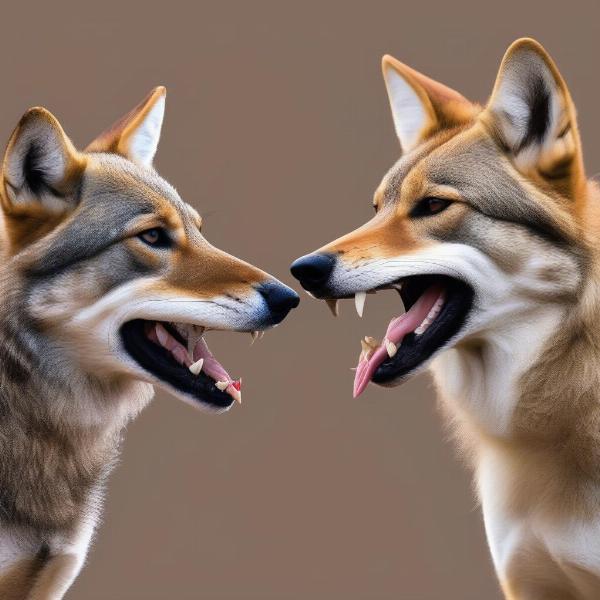Coyote and dog teeth, while sharing some similarities due to their canine ancestry, exhibit key differences reflecting their distinct diets and lifestyles. Understanding these differences can be fascinating for anyone interested in animal anatomy and can even be helpful in identifying animal remains. This article will delve into a comparative analysis of coyote and dog teeth, exploring their structure, function, and evolutionary adaptations.
Size and Shape: Key Distinguishing Features
One of the most obvious differences between coyote and dog teeth lies in their overall size. Coyotes, being generally smaller than most domestic dogs, have proportionally smaller teeth. However, relative to their skull size, coyote teeth, especially the canines and carnassials, are larger and more prominent than those of a similarly sized dog. This reflects the coyote’s wild diet and the need for efficient killing and tearing of prey.
The shape of the teeth also offers clues. Coyote canines are typically more slender and pointed, designed for deep penetration and gripping prey. Dog canines, while still pointed, can vary significantly in size and shape depending on the breed, reflecting the diversity of roles dogs have been bred for, from hunting to companionship.
The Carnassial Teeth: Adapted for Different Diets
Carnassial teeth, the upper fourth premolar and lower first molar, are highly specialized for shearing flesh and bone. In coyotes, these teeth are proportionally larger and sharper than in most dogs, reflecting their reliance on hunting and scavenging. Domestic dogs, with their more varied diets, often have less developed carnassials, particularly in breeds not primarily used for hunting.
Dental Formula: A Shared Ancestry
While the size and shape differ, coyotes and dogs share a similar dental formula, a representation of the number and types of teeth in their mouths. The typical canine dental formula is: Incisors 3/3, Canines 1/1, Premolars 4/4, and Molars 2/3. This shared dental formula reflects their shared ancestry and placement within the Canidae family.
Wear and Tear: Reflecting Lifestyle
Examining tooth wear can also reveal differences in diet and lifestyle. Coyotes, with their wild diet, often exhibit more wear and tear on their teeth compared to domestic dogs fed processed food.  Coyote and Dog Teeth Wear The type of wear can also indicate the types of food the animal consumes, with more bone consumption leading to more chipping and flattening of the teeth.
Coyote and Dog Teeth Wear The type of wear can also indicate the types of food the animal consumes, with more bone consumption leading to more chipping and flattening of the teeth.
Conclusion: Teeth as a Window into Ecology
Comparing coyote teeth vs. dog teeth provides valuable insights into the adaptations of these canids to their respective environments and diets. The differences in size, shape, and wear patterns highlight the specialized needs of a wild predator compared to a domesticated companion. Understanding these differences can enrich our understanding of animal biology and ecology.
FAQ:
- Do coyotes and dogs have the same number of teeth? Generally, yes. Both typically follow the canine dental formula.
- Why are coyote canines so sharp? Sharp canines are essential for killing and holding prey.
- What are carnassial teeth used for? Carnassials are specialized for shearing flesh and bone.
- Can you tell a coyote from a dog by its teeth alone? While teeth provide clues, other factors like skull shape and size are also necessary for accurate identification.
- Why are domestic dog teeth often less worn than coyote teeth? Domestic dogs often consume softer, processed food, leading to less wear.
- Do all dog breeds have the same tooth shape? No, tooth shape varies between breeds, reflecting different roles and breeding purposes.
- How can studying teeth help us understand animal ecology? Teeth provide insights into diet, hunting habits, and overall lifestyle, contributing to our understanding of animal ecology.
About ILM Dog
ILM Dog is your trusted resource for all things dog-related. We provide comprehensive information on dog breeds, health, training, nutrition, grooming, and much more, catering to both new and experienced dog owners worldwide. Whether you’re looking to choose the right breed, learn about canine health issues, or find the best dog products, ILM Dog offers expert advice and practical tips. Contact us at [email protected] or +44 20-3965-8624 for any inquiries.